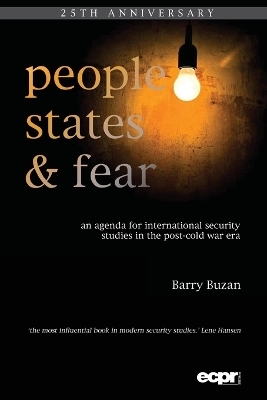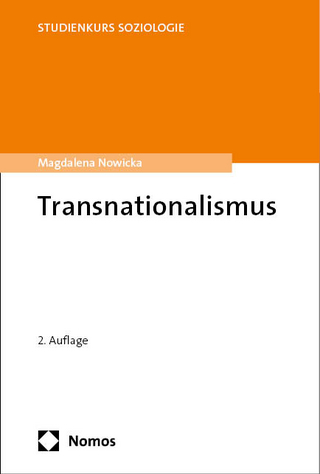
People, States and Fear
ECPR Press (Verlag)
978-0-9552488-1-8 (ISBN)
Barry Buzan is a Professor of International Relations at the London School of Economics, and honorary professor at the University of Copenhagen. He has published and broadcast extensively in the field of international relations. He took his first degree at the University of British Columbia (1968), and his doctorate at the London School of Economics (1973). From 1988 to 2002 he was Project Director at the Copenhagen Peace Research Institute (COPRI). From 1995 to 2002 he was research Professor of International Studies at the University of Westminster, and before that Professor of International Studies at the University of Warwick. During 1993 he was visiting professor at the International University of Japan, and in 1997-8 he was Olof Palme Visiting Professor in Sweden. He was Chairman of the British International Studies Association 1988-90, Vice-President of the (North American) International Studies Association 1993-4, and founding Secretary of the International Studies Coordinating Committee 1994-8. Since 1999 he has been the general coordinator of a project to reconvene the English school of International Relations, and from 2004 he is editor of the European Journal of International Relations. In 1998 he was elected a fellow of the British Academy, and in 2001 he was elected as an Academician of the Association of Learned Societies in the Social Sciences.
contents
New Introduction by the Author 1
Preface to the First Edition 17
Preface to the Second Edition 19
Figures and Tables 23
Introduction 25
The National Security Problem in International Relations 25
Security as an Underdeveloped Concept 26
Developments During the 1980s 32
The Approach of this Book 34
The Structure of this Book 42
Chapter 1 Individual Security and National Security 49
Individual Security as a Societal Problem 49
Individual Security and the Two Faces of the State 52
The State as a Source of Threat 55
Conclusions: Individual Security and National Security 59
Chapter 2 National Security and the Nature of the State 65
Identifying the State as an Object of Security 65
The Idea of the State 74
The Institutions of the State 83
The Physical Base of the State 88
Conclusions: Weak and Strong States 92
Chapter 3 National Insecurity: Threats and Vulnerabilities 104
Threats and Vulnerabilities 104
Types of Threat by Sector 107
The Operation of Threats 119
Conclusions: The Ambiguity of Threats 124
Chapter 4 Security and the International Political System 128
The Nature of the International Anarchy 128
The Character of States 133
The Uses and Limitations of System Structure in Security Analysis 138
International Society 142
Conclusions: Anarchy and Security 148
Chapter 5 Regional Security 157
Filling the Gap Between State and System Levels:
Security Complexes 157
A Brief History of Regional Security 168
Security Complexes as Structures: The Processes and
Outcomes of Change 173
Conclusions: Security Complexes and Policy Analysis 182
Chapter 6 Economic Security 189
The Nature of the International Political Economy 189
The Idea of Economic Security 192
Economic Security and the State 197
Economic Security and the International System 202
Conclusions: Prospects for the Political Economy of a
Mature Anarchy 210
Chapter 7 The Defence Dilemma 217
The Defence Dilemma Defined 218
The Historical Development of the Defence Dilemma 221
The Durability of the Defence Dilemma 228
Conclusions: The Defence Dilemma and Security 230
Chapter 8 The Power-Security Dilemma 234
The Power and Security Struggles 234
Revisionism versus Status Quo 237
The Nature of Revisionism 241
The Military Factor 246
Conclusions: Can the Power-Security Dilemma be Resolved? 252
Chapter 9 National and International Security:
The Policy Problem 258
Logical Problems 259
Perceptual Problems 269
Political Problems 272
Conclusions: Policy-Making as Part of the National
Security Problem 277
Chapter 10 Concluding Thoughts on International
Security Studies 283
Overview: The Agenda of Security 283
Reasons for Adopting, and Consequences of, a Broad
Interpretation of Security 287
Implications for Policy 291
Index 297
| Verlagsort | Colchester |
|---|---|
| Sprache | englisch |
| Maße | 158 x 224 mm |
| Gewicht | 544 g |
| Themenwelt | Sozialwissenschaften ► Politik / Verwaltung ► Europäische / Internationale Politik |
| ISBN-10 | 0-9552488-1-7 / 0955248817 |
| ISBN-13 | 978-0-9552488-1-8 / 9780955248818 |
| Zustand | Neuware |
| Haben Sie eine Frage zum Produkt? |
aus dem Bereich


